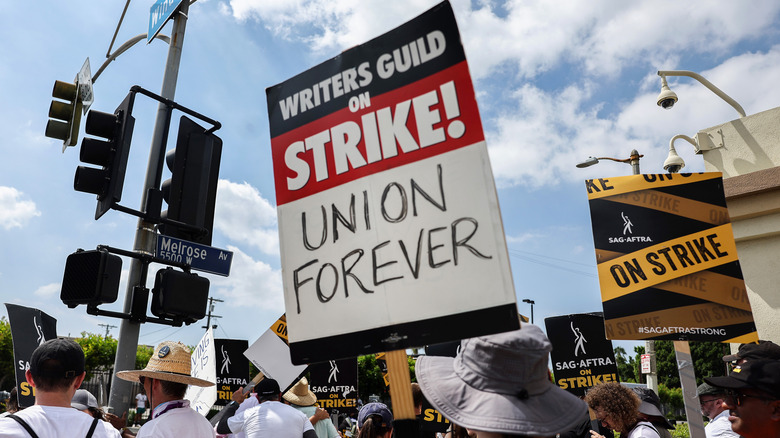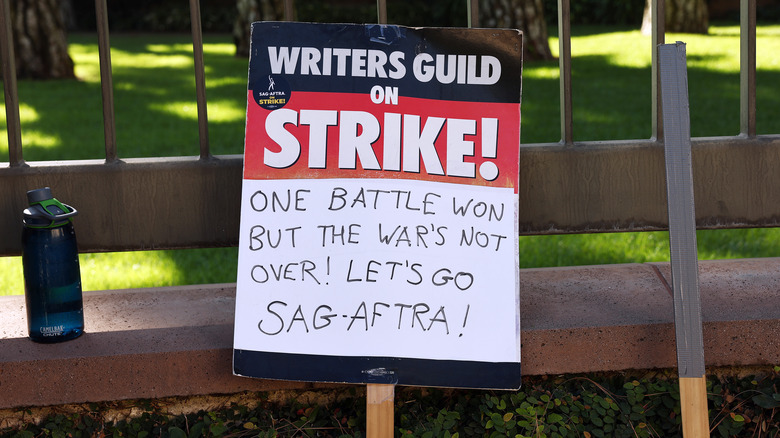WGA And AMPTP Reach Deal To End Writers Strike
For months, members of the Writers Guild of America have taken to the streets in the form of a strike, hopeful to have their demands met by the Alliance of Motion Picture and Television Producers. Though it seemed for some time that the AMPTP had no interest in coming to the negotiation table, both sides have now walked away with a new union contract. At long last, the WGA and AMPTP have reached a deal, effectively ending the writers' strike.
"We can say, with great pride, that this deal is exceptional – with meaningful gains and protections for writers in every sector of the membership," the WGA's negotiating committee said in a statement to its membership (via Variety). While it's evident that compromises had to be made during the negotiation process, the leadership of the WGA is at least satisfied with what this bargaining has brought to fruition.
Even though a deal has been reached and the strike suspended, official ratification from the members still needs to happen. So let's dig a little deeper into the terms of the new WGA deal and see exactly what the union was able to gain.
What does the new WGA deal entail?
Representatives for the Writers Guild of America made it clear during the strike that they wouldn't cave without substantial gains in multiple areas. According to the official details of the union's new deal, that mission has been thoroughly accomplished.
Streaming residuals constituted one of the guild's primary points of focus during the strike, with numerous writers sharing just how meager their streaming royalties have been in recent years compared to traditional TV work of similar success. Under the new minimum basic agreement, or MBA, residual rates for made-for-streaming projects have risen, both for domestic and foreign viewership.
There's also a new bonus system in place for streaming content, which is based on the total hours streamed and the percentage of each platform's subscriber base that viewed a particular movie or show. This deal dictates more transparency between studios and the WGA about streaming data. According to the guild, these changes constitute "a 26% increase in the residual base," as well as "a 76% increase (including a 2.5% base increase) to the foreign residual for the services with the largest global subscriber bases over 3 years." The potential bonuses for hit projects magnify those gains substantially. These increases add to the overall minimum rate raises for all contracts, which will continue to rise through the new MBA over the next three years.
What does the new MBA mean for AI?
In addition to improving streaming residuals, restricting the use of artificial intelligence for Hollywood writing purposes was a major mission of the WGA strike. The union won big in that department as well. According to the guild's official outline of the new deal, "AI can't write or rewrite literary material, and AI-generated material will not be considered source material under the MBA, meaning that AI-generated material can't be used to undermine a writer's credit or separated rights."
The MBA provides writers the right to use AI in their writing process if they choose to, but they must receive permission from the studio in order to do so. There's also a protection in place to keep MBA-covered writing from being used to train AI without writers' consent.
This is a massive win for writers, keeping generative AI in check and returning the power of that decision-making to the people who actually make the scripts happen.
How the new WGA deal helps writers' rooms
Another focal point of the Writers Guild strike was preserving the writers' room — an institution in the industry that has been squeezed and strained in recent years. The new MBA requires a minimum number of writers to be hired for both pre-greenlight (or "development" rooms) and traditional writers' rooms. It also establishes a higher, "premium" pay rate for writers' rooms that guarantee less than 20 weeks of work.
Per the guild: "Writers of any title working in pre-greenlight rooms of at least 3 writers—including a pre-greenlight room between seasons of a show—will be paid premium rates up to guarantees of 19 weeks." In addition, "Once 3 writers are convened before a series order, at least 3 writer-producers (including the showrunner) are guaranteed 10 consecutive weeks of employment. Development rooms where writers are guaranteed 20 weeks of work or more are treated as post-greenlight rooms. For these rooms on first season shows, the minimum staff size required will be 3 writer-producers (including the showrunner). For these rooms in the second or subsequent season of a show the required minimum number of writers is determined by the anticipated episode order."
In other words, there are far more protections in place to make every level of TV writing more stable and sustainable, including better standards for health and pension benefits. Lastly, the new deal stipulates that "for HBSVOD and Pay TV that are exclusively filmed in the US and Canada, 2 writer-producers must be employed for the lesser of 20 weeks of production or the duration of production along with the showrunner." That guarantees more steady work for writers even after production begins, while also lightening the load on overworked showrunners.
How long does the new Writers Guild deal last?
The new WGA MBA will be in place until May 1, 2026, presuming it gets passed. It still needs to be ratified by a guild membership vote, which will take place between October 2 and October 9, 2023. Theoretically, that vote could lead to a rejection, which would put the union back on strike. However, given all of the victories in the new MBA and the fact that the strike has been at least temporarily suspended, it seems highly unlikely that the deal wouldn't be ratified.
Of course, Hollywood still can't return to business as usual quite yet. An end to the writers' strike means that projects can start being written again, but SAG-AFTRA remains on the picket line. With luck, the gains won by the WGA foretell a satisfying end to that strike as well. The studios clearly want to get things moving again, and the victories of the Writers Guild could even become effective leverage for the actors.
The new MBA shows just how effective of a combination proper organization and tenaciousness can be. The stipulations on streaming pay, writers' rooms, and AI usage in particular are long-term accomplishments that should help solidify a level of stability in the industry for years to come. But the smaller victories — too many to recount in detail here — also add up to a stirring victory for the WGA.




